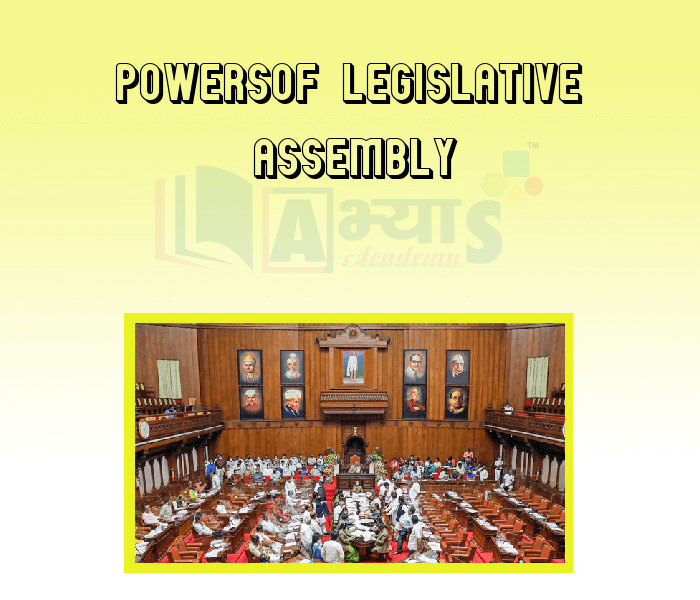Powersof Legislative Assembly











Powers of Legislative Assembly
(1) Legislative Power
(i) Article 365 - If the President's Rule is imposed due to the dissolution of the constitutional machinery in the State, Parliament can enact laws on the subjects of the State.
List in relation to that State If the crisis is applicable under Article 352 or 360, then Parliament can legislate on all subjects of the State List
(ii) Article 249 – If the Rajya Sabha passes a resolution with a 2/3 majority in respect of a subject in the State List that Parliament should enact legislation on this subject in the national interest. Parliament can do so.
According to Article _______________________, the Finance Minister of the State presents the financial statement every year in the assemblies. | |||
| Right Option : A | |||
| View Explanation | |||
Which of the following are correct : (a) Finance Bills are introduced in the Legislative Assembly only. (b) The Legislative Assembly has final power in relation to the Money Bill. | |||
| Right Option : C | |||
| View Explanation | |||
Which of the following are correct : (a) Elected members of the State assembly participate in the election of the President. (b) Members of the Legislative Assembly elect 2/3 of the members of the State Legislative Council. (c) Members of the State Legislative Assembly elect one of the members as Speaker and a Deputy Speaker from their members. | |||
| Right Option : C | |||
| View Explanation | |||
Students / Parents Reviews [10]
A marvelous experience with Abhyas. I am glad to share that my ward has achieved more than enough at the Ambala ABHYAS centre. Years have passed on and more and more he has gained. May the centre flourish and develop day by day by the grace of God.

Archit Segal
7thIt has a great methodology. Students here can get analysis to their test quickly.We can learn easily through PPTs and the testing methods are good. We know that where we have to practice

Barkha Arora
10thMy experience with Abhyas academy is very good. I did not think that my every subject coming here will be so strong. The main thing is that the online tests had made me learn here more things.

Hiya Gupta
8thAbout Abhyas metholodology the teachers are very nice and hardworking toward students.The Centre Head Mrs Anu Sethi is also a brilliant teacher.Abhyas has taught me how to overcome problems and has always taken my doubts and suppoeted me.

Shreya Shrivastava
8thMy experience was very good with Abhyas academy. I am studying here from 6th class and I am satisfied by its results in my life. I improved a lot here ahead of school syllabus.

Ayan Ghosh
8thOne of the best institutes to develope a child interest in studies.Provides SST and English knowledge also unlike other institutes. Teachers are co operative and friendly online tests andPPT develope practical knowledge also.

Aman Kumar Shrivastava
10thAbhyas is a complete education Institute. Here extreme care is taken by teacher with the help of regular exam. Extra classes also conducted by the institute, if the student is weak.

Om Umang
10thBeing a parent, I saw my daughter improvement in her studies by seeing a good result in all day to day compititive exam TMO, NSO, IEO etc and as well as studies. I have got a fruitful result from my daughter.

Prisha Gupta
8thIt was good as the experience because as we had come here we had been improved in a such envirnment created here.Extra is taught which is beneficial for future.

Eshan Arora
8thAbhyas Methodology is very good. It is based on according to student and each child manages accordingly to its properly. Methodology has improved the abilities of students to shine them in future.
